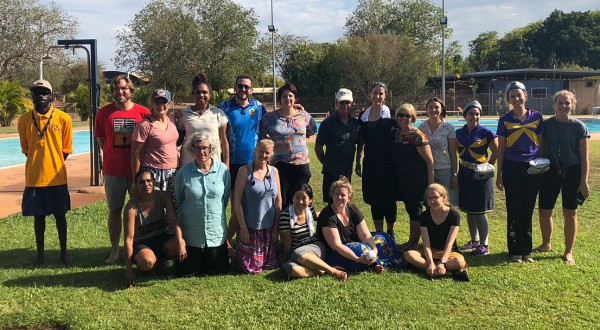Rheumatic heart disease screenings continue in Maningrida


Health professionals and Maningrida stakeholders have come together to continue screenings of rheumatic heart disease (RHD) and the Pedrino study at the Maningrida Pool this week.
This positive action comes about following the recent study by Menzies School of Health Research which revealed children in the West Arnhem Land community of Maningrida and its homelands suffer the highest known rates of rheumatic heart disease in the world.
The Menzies School tested more than 400 children from the remote community and found that one in 20 of them suffered from the disease - a condition which is entirely preventable.
Now building on the successes and lessons learned from this first round of screening, the team arrived in Maningrida for a second round to reach those children and young people who missed out last time.
By day two, over 140 screenings had been carried out with several cases detected and treatments already begun onsite.
Dr Josh Francis emphasised that a fundamental part of this process is to train local staff in how to screen, treat and educate about RHD so, in the future, it can be entirely managed locally.
“All screenings are conducted by both a cardiologist and a local worker,” he said.
Chelsea Ryan from the Maningrida Community Health Centre has been trained in the RHD screening process and has been involved in the screening of hundreds of local children.
Chelsea said, “I hope that the screening this week shows an improvement from last time we screened - I hope there will be less children with this condition.”
“It is important to help people in Maningrida and elsewhere to understand their heart health. Once we are successful here in Maningrida, we can share our stories and what we learn with other communities affected by RHD.”
Over the remaining three days, the Menzies team will test more than 50 children and young people; principally those based in outer parts of the community and surrounding outstations.
Dr Francis said, ultimately, the hope is to work with the community to completely stop RHD.
“We want to check every child’s heart in Maningrida and the homelands, because if we can find them early, we can provide treatment and help them live a long and healthy life,” he said.
“The data will also be used to advocate for better services for Maningrida. We have already been to Canberra to bring greater awareness to this important issue, and rally the government to get behind us and support better health in Arnhem Land.”
In October, the Brown family from Maningrida travelled over 4000 kilometres with the Menzies team to speak directly with government about this critical issue.
When asked why this process is so important, Mala’la Community Health Worker Tiffy Taylor said, “It’s so our kids can have a better future and the longest life. If they don’t know how to look after their heart, they have no future. An important part of this process is education about how to look after your heart and your health.”
Captain Starlight staff have also been in town to support families through the process. The Captains note that despite the heavy news that some families have received, “It has been a fun few days, the kids and their families have been lovely; it is very special to have been invited to be a part of this important process”.

